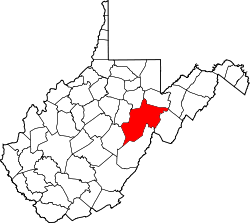Faulkner | |
|---|---|
| Coordinates: 38°54′34″N79°43′35″W / 38.90944°N 79.72639°W | |
| Country | United States |
| State | West Virginia |
| County | Randolph |
| Elevation | 2,267 ft (691 m) |
| Time zone | UTC-5 (Eastern (EST)) |
| • Summer (DST) | UTC-4 (EDT) |
| GNIS ID | 1554448 [1] |
Faulkner is an unincorporated community in Randolph County, West Virginia, United States.


